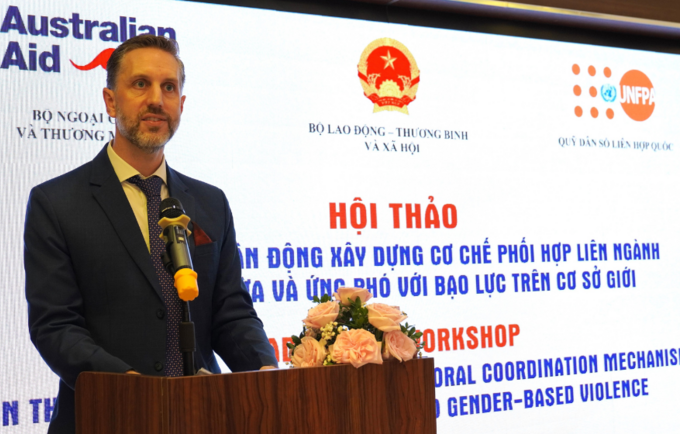- Excellency Mdm. Nguyen Thi Ha, the Vice Minister of Labour, Invalids and Social Affairs;
- Senior officials from the Ministry of Labour, Invalids and Social Affairs; and Ministry of Culture, Sports and Tourism;
- Representatives from local authorities of the provinces of Ha Tinh, Quang Ninh, Thanh Hoa, Nghe An, Da Nang, and Ho Chi Minh City and from the One Stop Service Centres – Anh Duong Houses;
- Local media.
I thank the Ministry of Labour, Invalids and Social Affairs, particularly Madam Nguyen Thi Ha for organising this workshop. It’s a pleasure to see you again Deputy Minister Ha. We recently met at an event at FPT University drawing attention to the harms of technology-facilitated gender-based violence, so I already know that you are a champion for ending all forms of violence against women and girls.
It is my honour to be invited to the central province of Ha Tinh. This is my first visit to this province and I have learnt that Ha Tinh has many historical and cultural interests including as the home of many national heroes and cultural figures such as Nguyễn Du, the great poet of Viet Nam. Before I came out to Viet Nam, I watched the 2021 film “Kieu” based on The Tale of Kieu by Nguyễn Du so it’s fitting that I visit Ha Tinh so early in my posting.
Of course, there are many other illustrious people from Ha Tinh and I look forward to learning more about this impressive Province.
Today’s workshop will enable you all to share experiences and lessons learned in developing and operating multisectoral coordination mechanisms to prevent and respond to gender-based violence (GBV). It is my hope that this will support the development of a national-level multi-sectoral coordination mechanism to address GBV comprehensively and consistently across Viet Nam.
I look forward to hearing your views and your recommendations to promote such an important mechanism to ensure better support to survivors of gender-based violence in both the real and the virtual world.
Dear participants,
Violence against women and girls happens everywhere including homes, schools, businesses, parks, public transport, sport arenas and, increasingly, cyberspace.
Globally, nearly 1 in 5 women have experienced physical or sexual violence by a current or former intimate partner in the last year alone. And 85% of women have reported witnessing online violence, with nearly 40% experiencing it personally – and the problem is growing.
In Viet Nam, the findings of the 2nd National Study on Violence against Women in Vietnam in 2019, showed that 63% of married women aged 15-64 reported experiencing some form of violence at least once in their lifetime by their husbands or intimate partners. Half of women who experienced violence kept silent, and over 90% of GBV survivors did not seek any help at all.
I mentioned the recent discussion that Deputy Minister Ha and I had with 400 students at FPT University in Hanoi. We discussed how Gen-Z can prevent, respond to, and protect themselves from technology-facilitated gender-based violence. The discussion concluded that digital violence is real violence and that addressing technology – facilitated gender-based violence is no longer negotiable. It’s vital to ensure that everyone can freely participate online, without fear of violence or abuse.
But we have much progress to celebrate. Viet Nam has made huge efforts to prevent and respond to GBV through various legal and policy frameworks. The approval of the 2022 Law on Domestic Violence Prevention and Control constituted the highest political will of the Government of Viet Nam to eliminate GBV. However, we know that a silo approach will not end GBV. Therefore, a national mechanism will help to ensure harmonised coordination among different sectors and stakeholders.
Indeed, I saw this coordination during my first visit in my role as UNFPA Representative to the One Stop Service Centre (OSSC) in Quang Ninh province. I was impressed by how a partnership between UNFPA, MOLISA, government departments and donors could deliver on such an important and much-needed service. With staff trained on multi-sector operations we have truly placed the individual at the centre.
I also met the OSSC Director who told me that the key to success was coordination with government agencies. She also gave recommendations to further improve services which I took with me on my recent visit to the OSSC in Da Nang. What is clear is that the continued operations of Anh Duong houses require multi-sectoral coordination and continued investment to grow and support survivors.
UNFPA commits to support the Government of Viet Nam to develop a multi-sectoral coordination mechanism at national and provincial levels, ensuring alignment with global standards and to leave no one behind. This will help to ensure that GBV is addressed comprehensively and consistently across Viet Nam and that all survivors can access timely and quality support services regardless of their location or situation.
Our shared goal is a vision of Vietnam where every woman and girl can live a life free of violence and abuse. Thank you.

